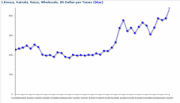Interviews, Comments
Soybeans To See Best Demand Growth In Grains - Goldman
Soybeans are expected to see the “lion’s share” of global demand growth for grain in the coming years due to increased meat demand, Jeffrey Currie, head of commodities research at Goldman Sachs, told Dow Jones Newswires Tuesday.
Speaking on the sidelines of the Food Security conference in London, Currie said annual demand growth for soybeans is expected to increase 3.5%, compared with 2.5% for corn and 1% for wheat. “Yields can’t keep up with demand anymore, we’ll have to expand acreage,” said Currie. Demand for grains used for animal feed will drive growing grain demand and soybeans are a key source of protein for meat production, said Currie.
- Read more
- 3463 reads
World Wheat Prices Seen Doubling In Next 3 Decades - IFPRI Exec
World wheat prices are expected to double in the next three decades, with an increase of up to 20% in the next decade, Joachim von Braun, director general of the International Food Policy Research Institute, told Dow Jones Newswires Monday. Speaking on the sidelines of a Food Security conference in London, von Braun said wheat is the most “troubled” grain crop going forward due to an expected increased incidence of disease combined with a lack of yield increases.
- Read more
- 3071 reads
Russian Banks Count Pigs, Lingerie as Collateral
When Russian billionaire Alexander Lebedev’sOAO National Reserve Bank seized collateral offered against a loan from a cash-strapped borrower, a health quarantine was slapped on the security: 40,450 pigs. “We had a court decision to take away the collateral, which is the pigs,” Lebedev, 49, said in an interview in Moscow. The borrower, a farm near Samara on the Volga river, agreed “with the local authorities to establish a quarantine” against African swine fever. The former KGB officer is still waiting to collect the pigs offered against a loan of 100 million rubles ($3.5 million). A kilogram of live pig costs an average of 78.4 rubles, the National Meat Association says.
- Read more
- 3799 reads
UN Food Chief: Economic Crisis Requires Swift Action On Hunger
“The current [economic] crisis is historically unprecedented in several ways,” Diouf said in the speech at the U.N.’s Food and Agriculture Organization’s headquarters in Rome. “As developing countries are more financially
and commercially integrated in the world economy, a drop in the global demand or supply and in credit availability had immediate repercussions on them,” he said.
- Read more
- 3200 reads
Growing Global Demand To Drive Food Prices Higher - StanChart
Food prices are likely to increase due to rising global demand, which could also fuel the risk of protectionist trade measures in future, Standard Chartered bank said Friday.
- Read more
- 3149 reads
World economy gropes on road to recovery amid mixed signs
As the International Monetary Fund(IMF) and the World Bank annual meetings approach as another arena for policy makers to discuss ways to resume and sustain growth, the world economy is scrabbling on the way out of the deepest recession since the 1930s.
- Read more
- 2715 reads












